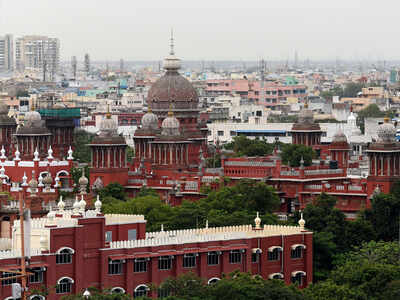
CHENNAI: In a setback to the Tamil Nadu government and its ambitious industrial and development projects worth more than Rs 80,000 crore, the Madras high court on Wednesday declared unconstitutional the exemption provided to three pieces of state legislation from the purview of the land acquisition act introduced by the Centre in 2013.
The exemptions, brought in through an amendment to the central act, had enabled Tamil Nadu to acquire land bypassing some stringent provisions of the original legislation. Now, if the state fails to get a reprieve from the Supreme Court, several projects in the pipeline, including Chennai Metro Rail phase-2, could face hurdles.
For, the state will then be forced to re-enact the Tamil Nadu Highways Act, the Tamil Nadu Acquisition of Land for Industrial Purposes Act and the Tamil Nadu Acquisition of Land for Harijan Welfare Schemes Act to bring them in line with the central act.
A division bench of Justice S Manikumar and Justice Subramonium Prasad also declared illegal all land acquisition processes made under the three state laws on or after September 27, 2013, the day the central act came into force.
However, cases where land was already put to use and the purpose for which the land was acquired had been accomplished were exempted. The state will now have to follow all the stringent regulations brought in the central act, which goes beyond fair compensation and mandates a series of entitlements for the affected land owner, particularly if it is agricultural land. It was to override such regulations that the state government introduced an amendment to the central act in the form of Section 105 A. Through the proviso, land acquisition under the three state laws were exempted from the purview of the central act. This amendment allowed the state to acquire land for industrial and infrastructural development by bypassing various stringent conditions such as survey, socioenvironment impact assessment, and public hearing.
Aggrieved, more than 100 farmers whose lands were acquired by the state, particularly for the Uppur thermal power project in Ramanathapuram and for a Taiwan-based electronics manufacturing company in Krishnagiri, moved the high court challenging the state amendment.
Representing a batch of petitioners, senior counsel P Wilson contended that the amendment is manifestly arbitrary. Explaining how the state government was bent upon unreasonably classifying landowners for adverse treatment, Wilson said, “For construction of Metro Rail, there is a special legislation called the Metro Rail Construction of Works Act, 1978. Under this act, the government has the power to acquire land for the purpose of establishing Metro Rail. All it takes is a notification under the act notifying the city where the metro rail is to be constructed.”
However, without invoking the provisions under this special act, the state is acquiring land under the Tamil Nadu Acquisition of Lands for Industrial Development Act, primarily to override the central act through the exemption, he argued.
Allowing the petitions, the bench said the three state enactments cannot be said to be operative in the state by virtue of Section 105A, as they were null and void as of the date the central act came into force, that is on September 27, 2013. “We further hold that in order to revive these acts it is necessary to re-enact these laws in accordance with the provisions of the new act [central act]. Mere insertion of Section 105A in the new act would not save these acts from repugnancy,” the court said.
The exemptions, brought in through an amendment to the central act, had enabled Tamil Nadu to acquire land bypassing some stringent provisions of the original legislation. Now, if the state fails to get a reprieve from the Supreme Court, several projects in the pipeline, including Chennai Metro Rail phase-2, could face hurdles.
For, the state will then be forced to re-enact the Tamil Nadu Highways Act, the Tamil Nadu Acquisition of Land for Industrial Purposes Act and the Tamil Nadu Acquisition of Land for Harijan Welfare Schemes Act to bring them in line with the central act.
A division bench of Justice S Manikumar and Justice Subramonium Prasad also declared illegal all land acquisition processes made under the three state laws on or after September 27, 2013, the day the central act came into force.
However, cases where land was already put to use and the purpose for which the land was acquired had been accomplished were exempted. The state will now have to follow all the stringent regulations brought in the central act, which goes beyond fair compensation and mandates a series of entitlements for the affected land owner, particularly if it is agricultural land. It was to override such regulations that the state government introduced an amendment to the central act in the form of Section 105 A. Through the proviso, land acquisition under the three state laws were exempted from the purview of the central act. This amendment allowed the state to acquire land for industrial and infrastructural development by bypassing various stringent conditions such as survey, socioenvironment impact assessment, and public hearing.
Aggrieved, more than 100 farmers whose lands were acquired by the state, particularly for the Uppur thermal power project in Ramanathapuram and for a Taiwan-based electronics manufacturing company in Krishnagiri, moved the high court challenging the state amendment.
Representing a batch of petitioners, senior counsel P Wilson contended that the amendment is manifestly arbitrary. Explaining how the state government was bent upon unreasonably classifying landowners for adverse treatment, Wilson said, “For construction of Metro Rail, there is a special legislation called the Metro Rail Construction of Works Act, 1978. Under this act, the government has the power to acquire land for the purpose of establishing Metro Rail. All it takes is a notification under the act notifying the city where the metro rail is to be constructed.”
However, without invoking the provisions under this special act, the state is acquiring land under the Tamil Nadu Acquisition of Lands for Industrial Development Act, primarily to override the central act through the exemption, he argued.
Allowing the petitions, the bench said the three state enactments cannot be said to be operative in the state by virtue of Section 105A, as they were null and void as of the date the central act came into force, that is on September 27, 2013. “We further hold that in order to revive these acts it is necessary to re-enact these laws in accordance with the provisions of the new act [central act]. Mere insertion of Section 105A in the new act would not save these acts from repugnancy,” the court said.
Quick Links
Lok Sabha Election Schedule 2019Lok Sabha Election NewsDelhi Capitals teamMI team 2019Rajasthan Royals 2019RCB team 2019Maharashtra Lok Sabha ConstituenciesBJP Candidate ListBJP List 2019 TamilnaduShiv Sena List 2019AP BJP List 2019Mamata BanerjeeBJP List 2019 MaharashtraPriyanka GandhiBJP List 2019 KarnatakaAMMK Candidate List 2019BJP List 2019 WBLok Sabha Elections in Tamil NaduBSP List 2019 UPNews in TamilLok Sabha Poll 2019Satta Matka 2018PM ModiMahagathbandhanNagpur BJP Candidate ListChandrababu NaiduTamil Nadu ElectionsUrmila MatondkarNews in TeluguMadras High CourtTejashwi YadavArvind KejriwalTejasvi SuryaPawan KalyanArvind KejriwalYogi AdityanathJaya PradaSatta King 2019Srinagar encounter
Get the app









